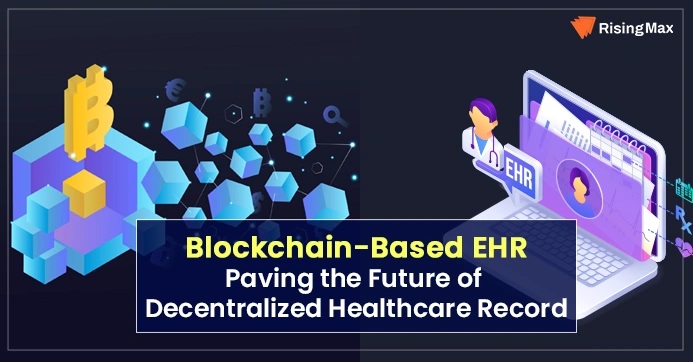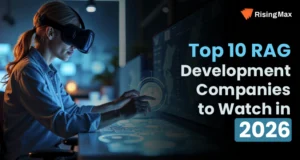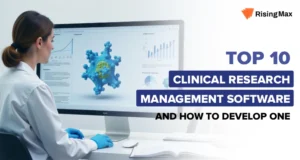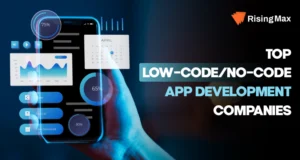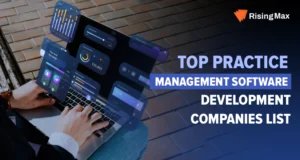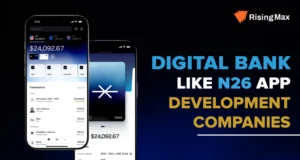Layering new essence, discovering new possibilities, and advancing platforms with modern-age technology have changed a lot of industries. Besides a few, the healthcare industry is still untouched by technology like electronic health records. Technology is maintaining its pace to move along. No words can really explain how the healthcare industry may bring fruitful rewards with a completely robust processing technology. Luckily, a few do!

Apparently, Blockchain is a reliable, highly secured, and business-oriented technology ready to deliver unbelievable benefits. The introduction of blockchain Electronic Health Records has emerged a lot of advantages that the healthcare industry has never foreseen.
Think of patients’ data moving from one healthcare institution to another in a fraction of a second and cutting off manpower with automated processes. These are a few that can wholly change the sphere with the unbelievable power of blockchain technology. Not much with that, but RisingMax Inc. can help reveal the secret keys to deliver to your platform. Wouldn’t you be interested in our consultation absolutely free of cost?
What Are Electronic Health Records?
An electronic health record, or EHR, is a digital record that stores a patient’s medical history in real-time. It stores patients’ treatment plans, lab results, diagnosis processes, and patient’s allergies.
An electronic health record saves data from wearable devices, doctor records, pharmaceuticals, and healthcare centers. EHR is capable of developing a large scenario of a patient’s overall treatment mechanism. Collecting all the available information through patients helps to identify better treatment plans for individuals.
What Are Blockchain-Based Electronic Health Records?
Blockchain can shift how patients’ electronic health records are saved and shared. It offers safe, transparent, and records retrieval for health data exchange. Blockchain technology can connect multiple information management systems for healthcare industries to exchange data. The way blockchain stores and saves the data, it can be retrieved seamlessly by patients and healthcare professionals.
E.g., A doctor is providing treatment to a patient. He must have patients’ personal records, health records, test results, and other important notes. Such data on the blockchain will be assigned to the patients’ public IDs that will be redirected to the blockchain using the application programming interface.
Also Read: How To Build A Web3 Dapp
How Important To Access Patient’s Data
Gone are the days when a patient had to wait several hours/days to collect his medical report. Annoying visiting hours at the clinical labs were so hectic. This ended up being a lot of investment in time and effort. Now, all those efforts are backed by a few clicks only. There are portals on healthcare channels allowing patients and medical professionals to access all the information they want to gather.
Patients’ engagement in the treatment procedure improves the healthcare industry. It makes it more lucrative since the conversation could be well-versed in understanding the medical condition, treatment plans, and goals.
Healthcare industries adhere to the guidelines advised by AHRQ. These are:
- Involving patients’ family members in the records
- Upgrade the public medical database
- Work in improvement, safety, structure development, and medical records
- Security protection & privacy plan
- Coordination in the patient’s care
Which Of The Issues Of EHR Can Blockchain Solve?
Universal Access To Medical Records
Patients and healthcare professionals have had difficulties sharing record access to other healthcare platforms because the system lacks common APIs that enable record access among different platforms. Thus, interoperability issues disable healthcare platforms from exchanging data with other healthcare institutions.
If Blockchain is introduced to healthcare platforms, it can lay the data from one system to another. Hence, a medical professional would have access to the historical view of patients’ records. Lots of blockchain implementation is underway for electronic health records of patients. Estonia has been announced as a “blockchain country” working on the security and real-time access of the EHR. IBM is already involved in working on the patient’s lifetime medical records.
Vaccine Management System
UNICEF has discovered that ⅓ of the storage vaccines in third world countries is wasted because keeping vaccines under control temperature is essential, resulting in the loss of millions of dollars. The vaccination records can be easily traced with the help of blockchain smart contracts. Placing in cargo can help monitor the cold storage temperature and keep track in real-time for quicker solutions.
The distributed ledger of records updates automatically; all participants can share that simultaneously. The blockchain improves traceability and provenance, so it will be highly informed about every step that will be taken in the supply chain processes.
Remote Healthcare Access And Asset Management
Think of a foreign tourist with medical healthcare requirements, which would go exclusive with the lack of cross-border integration between two different systems. In a decentralized peer-to-peer network model, a blockchain can enable a sharing electronic health record model allowing patients to utilize healthcare services in different systems.
Services like Uber use an integrated channel to serve their customers. Introduction to blockchain in healthcare will facilitate such remote services within different systems. Blockchain can solve many problems in the healthcare industry, such as access to quality medical services in remote areas. In the existing system, these services are very expensive, and the distance patients have to travel to access these services.
Storing Health Data With Wearable Devices
IoT has brought trends to the use of wearable devices in the healthcare industry. Healthcare small apps help track heart rate, pulse, sleep, and other activities through wearable devices. There are several software to keep track of elderly members for daily activities. When handling large data sets, these platforms will fail because the personal cloud storage is still accessible through the centralized system only.
It will distribute immutable records that are impossible to tamper or alter. “Healthbank,” a Swiss digital healthcare platform, collects data from wearable devices through an integrated channel and centrally resides in a highly secure system to have it accessible in real-time.
Change In Payments, Billings, And Claims
It provides identity management services to validate each transaction after verifying the other parties. Medical claims are processed adequately in a matter of seconds which used to take months in an old conventional system.
Payment and the billing system would be performed through the instant processes going through the previously agreed smart contracts. It works on a decentralized system that facilitates utilizing the power of decentralization and keeping the system highly secure while sharing the data across cross-border platforms.
Align the current state of IT with your business strategy by hiring the most trustworthy Blockchain Development Company
Benefits Of The Blockchain Healthcare
Patient-Centric EHR
The lack of coordination is the third biggest reason for death in the United States. History has witnessed how data silos have impacted many medical firms. A blockchain-based healthcare system that evolved Electronic Health records could be an option to overcome these challenges.
All the medical information would reside in the blockchain. This information includes treatment plans, patients’ medical reports, billings, doctor’s notes, and lab results. Later, such information would decrypt uniquely in the blockchain, which is stored as letters and numbers, commonly known as a hash function.
Transparency In Supply Chain Management
One of the major aspects of the healthcare institution is to ensure the quality of medical products. The blockchain can be of great help in such conditions that allow tracking of the products from core development to the supply chain of the products. This solely offers maximum visibility and transparency of the products at each stage of their lifecycle till successful delivery.
Transparency in the supply chain is essential because it builds the market where fake medical products are available that can be very harmful.
Reports suggest that tens of thousands of deaths are considered annually in the United States. It suggests improvement in the field of testing the quality and ensures that a healthcare institution uses original yet authentic medical products to slow down the rate of death in the united states.
Patient Data Sharing & Management
HIPAA, a govt. Healthcare institution has restricted the user’s private data. Such data will be isolated and available to the patients, doctors, and their family members. Managing and handling patient data in a traditional approach wouldn’t be easy. Blockchain is capable of rectifying this problem by providing a uniform platform that stores and manages information at a single location, ensuring security concerns.
A unique ID given to the patients can help identify patients’ data and access the data over different systems.
Blockchain has become a reliable solution for data management that follows standardization. It becomes the secure medium to safely patients’ data exchanges between multiple systems and allows health studies and monetization through the blockchain.
Cryptocurrency Payment Method
Blockchain helps in payment processing with cryptocurrency. Users are allowed to transact through their crypto wallet to send and receive digital funds. Blockchain also offers a micro-payment method, which rewards every patient who follows the doctor’s advice. This payment method holds all the records of the patients and associates to them. Also, it helps to know the patients’ activities and will be useful for the retreatment plan.
Reduction Of The Workload
Patients are able to send and receive messages and fix appointments with the consulting doctor. They can shoot their queries and get answered quickly. Patients access the data whenever they would like to and simply fix the appointment and follow up on the procedure. Patients can store/retrieve their data securely without worrying about filling out the form to save the data.
It saves patients priceless time and puts them in minimal effort. Patients will once be requested to fill up their medical history, informing them of all the treatment plans in the story. It gives a better insight to doctors to furnish a treatment plan according to the patient’s current medical condition.
Why RisingMax Inc. To Develop Blockchain Healthcare Platform?
As a leading US-based blockchain healthcare service provider, RisingMax Inc. can help you develop a blockchain platform with precision. With more than 5 years of dedicated experience in the blockchain healthcare industry, we’re more than delighted to take on challenges and deliver some of the industry’s most cutting-edge platform solutions. A few points that you might like to consider from us:
- Leading US-Based innovative software development company
- A decade of experience in the software development industry
- More than 5 years of exp. in blockchain healthcare platform
- 150+ Dedicated developers for blockchain-based solutions
- Fortune-500 satisfied clients
- Free assistance for every client
- A team dedicatedly serves every blockchain project
- Unlimited revisions during the platform development

In The End,
Blockchain would provide far better healthcare platforms than we have with many difficulties. Blockchain-enabled healthcare platforms make things easy. All the data processing would go with ease. Healthcare industries shall meet one of the finest treatment plans, payment methods with cryptos, and the use of advanced technologies. It offers a complete decentralized framework with the compliance to send/receive the information through the electronic health record.
Blockchain-enabled healthcare platforms have the capability to reduce friction, causing a reduction in the cost of mediators. Healthcare could see a perfect platform that not only saves a lot of lives but also make it easy for everyone to enjoy hassle-free treatment procedure. There’s great potential for blockchain in the healthcare industry, which can change the paradigm of the healthcare industry. We at RisingMax Inc. help develop visionary ideas into reality. Let us know some ideas or visions, and we’d sketch ‘em through.

